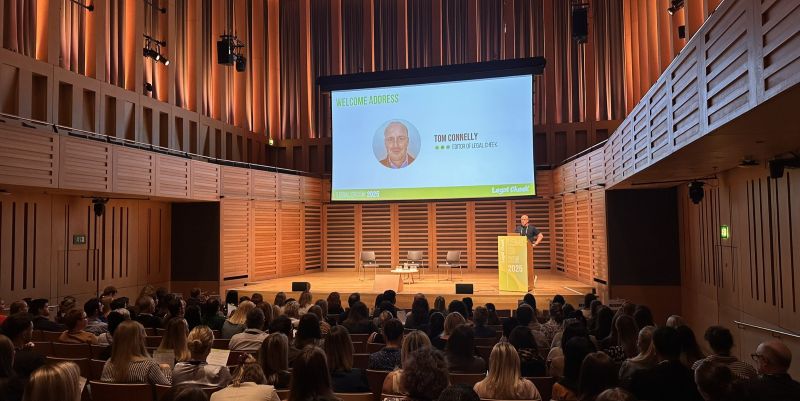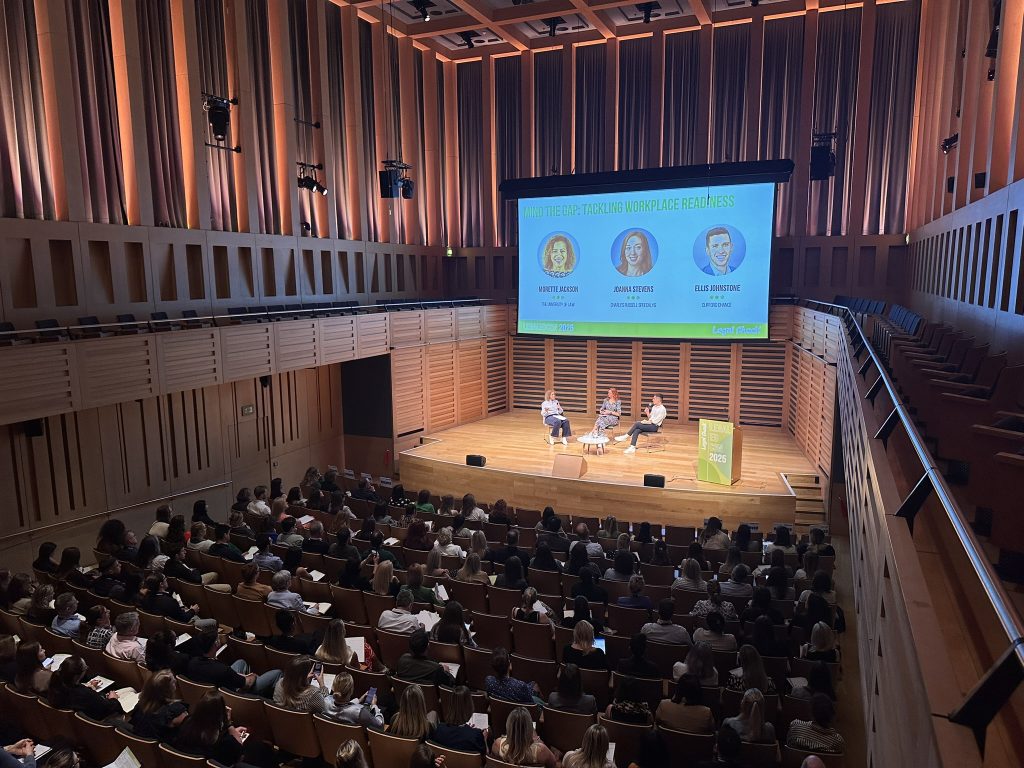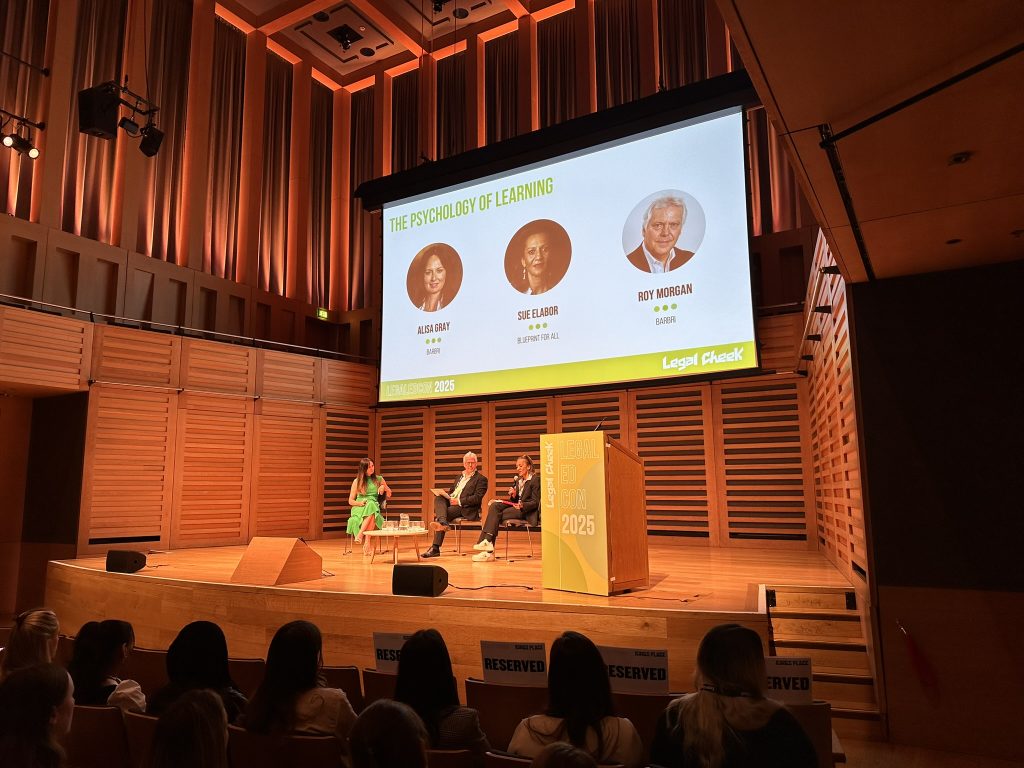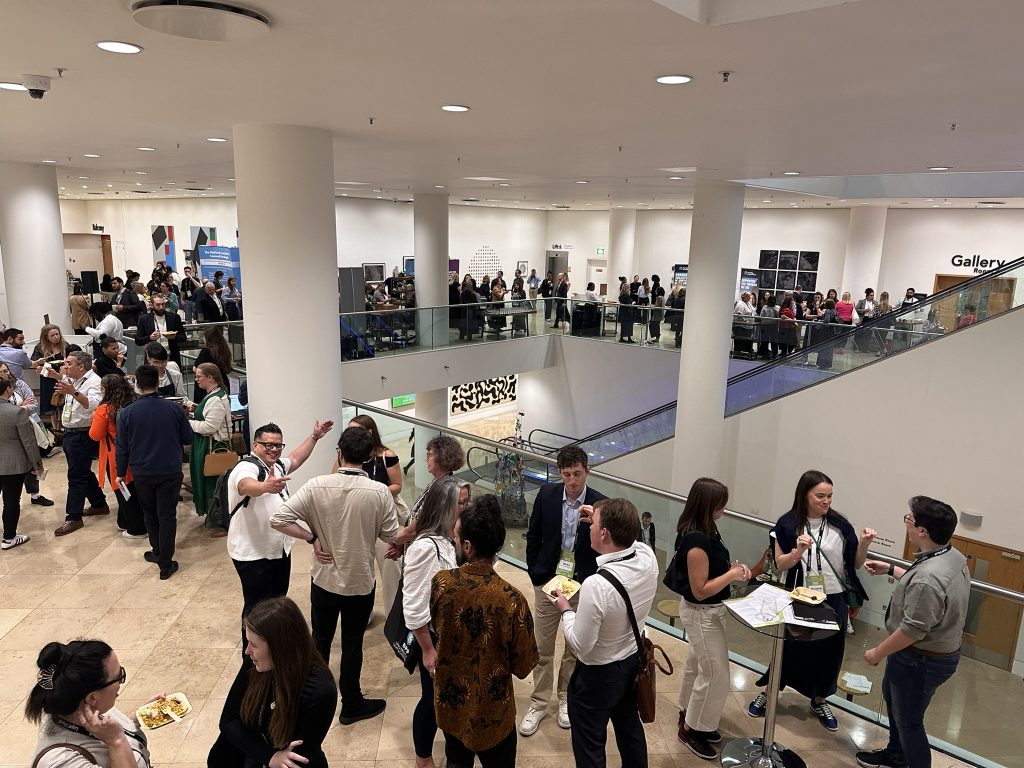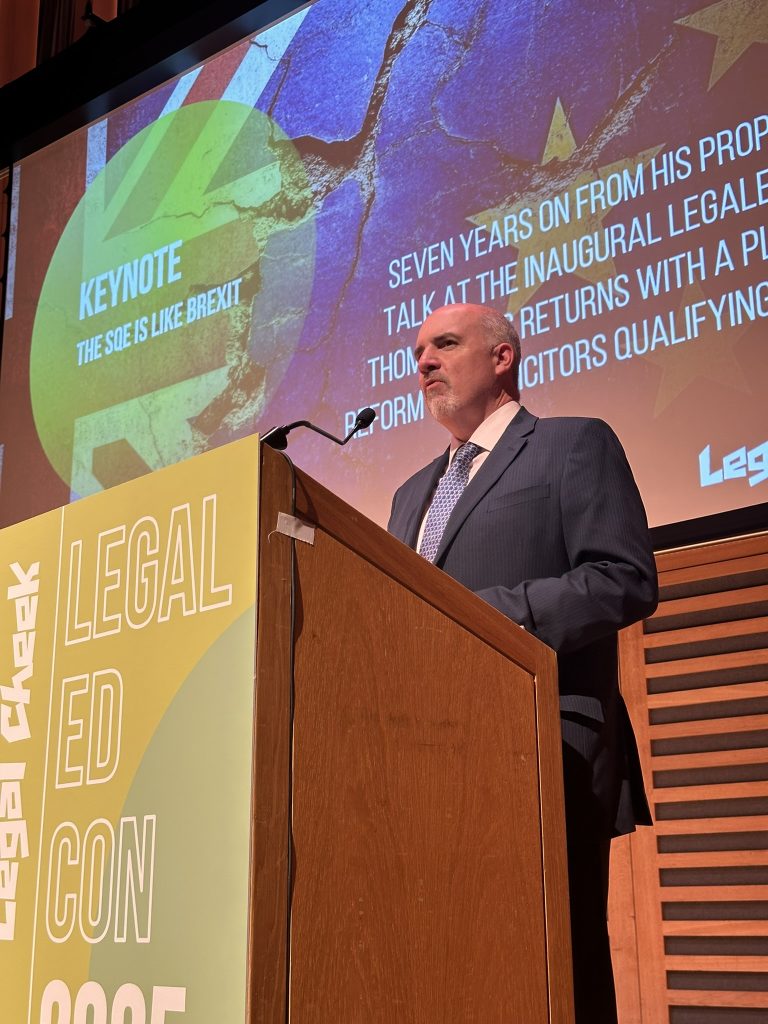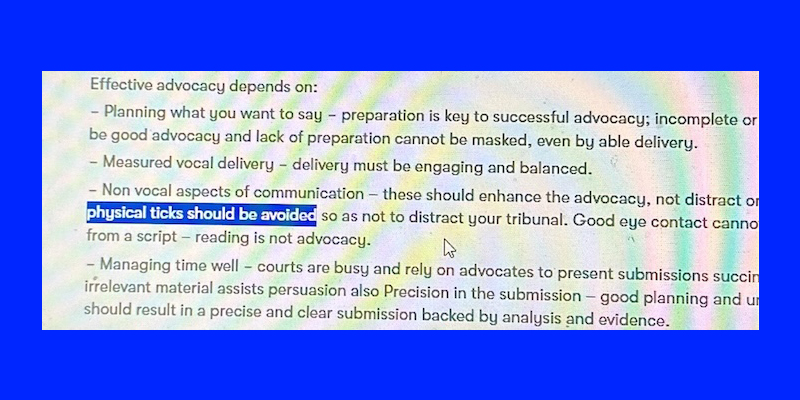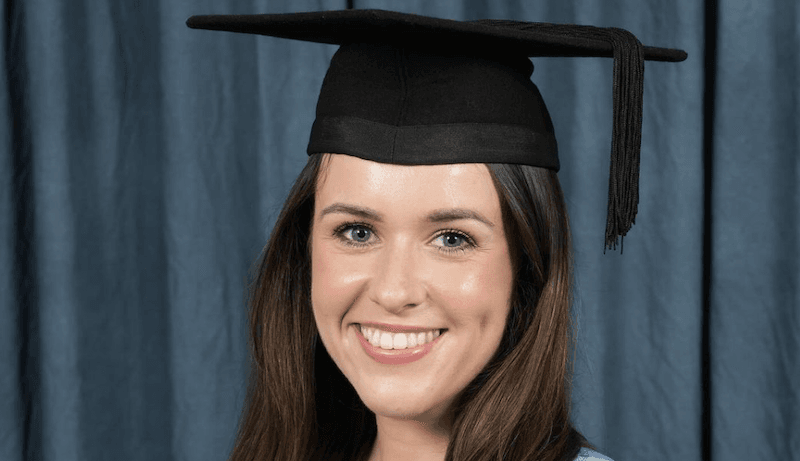Legal Cheek’s annual conference gathered together key figures from across the profession to discuss skills gaps, innovations, apprenticeships, SQE and more
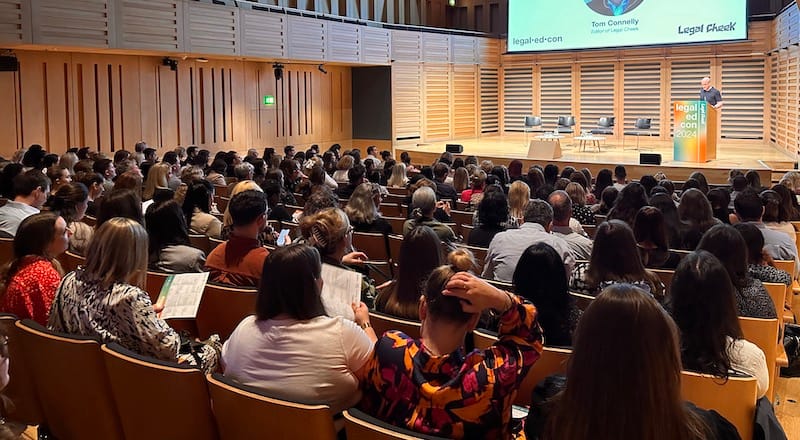
LegalEdCon 2024 returned to Kings Place in London yesterday with a host of talks exploring the hottest topics in legal education and training.
On the day of the conference, nearly 300 delegates gathered to hear the latest industry insights from leading experts in the legal field. This year’s conference featured sessions on a variety of topics, including the latest developments in the Solicitors Qualifying Exam (SQE) regime, innovations in solicitor training, addressing skills gaps, solicitor and graduate apprenticeships, and AI.
The keynote session this year focused on law influencers (dubbed ‘lawfluencers’) and offered attendees unique insights into the growing social media landscape in law. The session was delivered by a group of speakers with different perspectives on approaching working in the law whilst maintaining an online presence, including discussions on their experiences of the SQE and the skills that junior lawyers often lack.
Session 1: Skills and knowledge gaps: where are trainees and junior lawyers strong, and what do they need to improve?
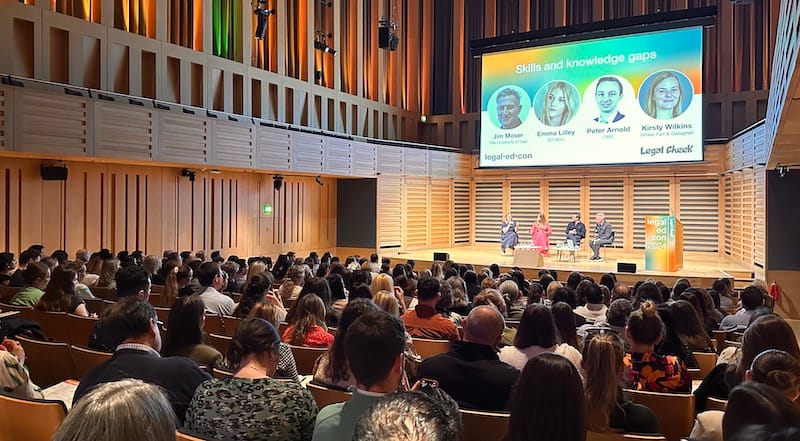
The speakers:
In the first session ULaw’s Jim Moser, Director of Professional Development, kicked off LegalEdCon 2024 with a session focusing on the skills and knowledge gaps in trainees and junior lawyers. The speakers candidly spoke on how law students can overcome setbacks and develop into successful, competent, and well-rounded lawyers. As the speakers explained, filling these gaps allows juniors lawyers to hit the ground running in their legal careers.
Peter Arnold, Head of Talent at CMS, spoke about future-proofing legal talent to ensure emerging juniors develop into well-rounded lawyers. He focused on what future lawyers need in the modern day, and how talent teams can focus on developing their juniors to fulfil the needs of law firms. He explained that the key characteristics and skills they need to develop are strong legal knowledge, tech-savviness, and a growth mindset. He noted that learning doesn’t stop at law school, when student are undertaking their qualifying studies or even when they become a newly-qualified lawyer; a “continual growth mindset” is key.
Next up, Emma Lilley, Head of Legal UK&I at SD Worx and Founder of ‘In-house Potter’ took to the lectern. She added some “in-house spice” to the conversation to speak on what in-house clients want from junior lawyers. She highlighted the importance of developing ethical standards by encouraging emotional intelligence, noting that leading by example is crucial in supporting individuals to stand up for their beliefs. Lilley also told the audience that communication skills are valuable in the modern, tech-driven, and hybrid workplace, and that in-house teams must be attuned to evolving forms of communication.
Finally, Kirsty Wilkins, Head of Professional Development at Willkie Farr & Gallagher, spoke on the allusive qualities that partners want to see in their juniors. She mentioned that, although tech skills and legal knowledge are essential, partners often prioritise interpersonal qualities. “People sell people,” she noted, emphasising that team spirit is crucial for juniors to develop into well-rounded lawyers.
Session 2: AI corner
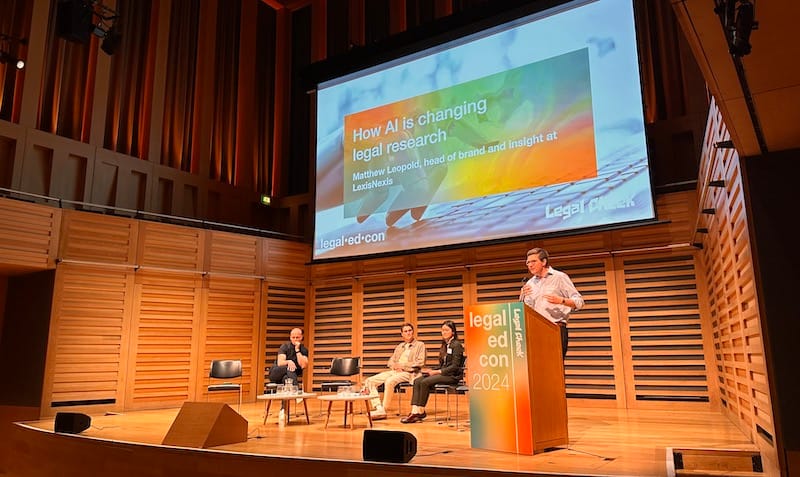
The speakers:
- Mike Kochkin, CEO of BeSavvy
- Matthew Leopold, Head of Brand and Insight at LexisNexis
- Samantha Hope, Head of Emerging Talent at Shoosmiths
- Samantha Wong, Events Coordinator at Legal Cheek presenting Aikanah, Legal Cheek’s AI Ambassador
Matthew Leopold, LexisNexis’ Head of Brand and Technology, opened the AI Corner session with an impassioned talk. He explained the incredible changes coming to the legal industry, pronouncing today’s lawyers as the luckiest legal generation so far. Being able to embed knowledge and experience in a changing world gives today’s lawyers the flexibility to approach AI technology in a way which is going to change the landscape of the legal education, he enthused. “Imagine what the opportunities will be when we think holistically about AI in the law”, he noted. Leopold finished up by explaining that advances in generative AI technology now gives lawyers the opportunity to draft e-mails and legal statements, and summarise research.
Next to take the lectern was Samantha Hope, Head of Emerging Talent at Shoosmiths, who was unable to attend the conference, but gave her talk via a pre-recorded video for the discussion. Talking on generative AI in training contract applications, she explained that one in three Shoosmiths’ applicants appeared to have used AI in their applications. Embracing this tech in legal practice, she explained, will allow lawyers to devote time on developing their wider skillset. So, she urged law firms to keep on top of technological developments and AI trends in order to make the most of the immense potential of gen AI tech. She finished by throwing a question to the audience: “Are you team AI or team ban AI in applications?”
Following this talk, Mike Kochkin, CEO of BeSavvy, spoke about the use of AI for junior lawyers. Using tech developed at his company BeSavvy, he explained how legal training can be simplified and honed through technology. He told the audience that “what took years can now take one day”, when it comes to legal training, through using “AI agents” to provide memory, tools and planning in the legal training process.
The final speaker of this session was Legal Cheek‘s own Samantha Wong, Events Co-ordinator and creator of Aikianah, Legal Cheek‘s AI influencer. She discussed the process of creating the AI ambassador, from Aikanah’s inception to her role as an influencer on Instagram. She discussed the creation process, including the AI prompts she used to produce images of Aikanah. She also divulged the challenges she faced, including the AI technology creating wonky hands, teeth, feet, and the limited extent to which AI can create photo-realistic videos.
Lunch and networking

Session 3: Solicitor apprenticeships: beyond the hype

The speakers:
- Lorna Bailey, Head of Learning and Development at Fletchers Solicitors
- Jane Robson, CEO at the the National Association of Licensed Paralegals
- Lucy Dolan, Early Talent Manager at Gowling WLG UK
- Bethany Taylor, Associate at Eversheds
- James Catchpole, Associate Professor and Head of Professional Programmes at City, University of London
- Patrick McCann, Legal Practice Chair of City of London Law Society Training Committee
James Catchpole, Associate Professor and Head of Professional Programmes at City, University of London, opened the discussion. He began by touching on the exceptional characteristics of many solicitor apprenticeships and the outstanding results they’re achieving on the SQE. Urging firms to increase intakes of apprentices, he noted that this route isn’t being embraced widely enough, nor diversely enough. He introduced a debate: “Why are firms so slow to embrace this route to qualification?”
For the Q&A session, our speakers answered questions on creating solicitor apprenticeship programmes, the benefits of having apprentices, and the challenges faced by firms implementing them. Lorna Bailey, Head of Learning and Development at Fletchers Solicitors, gave her tips for firms looking to take on apprentices. “Educate the firm about apprenticeships, as well as the wider communities in local schools,” she advised. “And be sure to track the data!”. Patrick McCann, Legal Practice Chair of City of London Law Society Training Committee, reaffirmed his overwhelming support for solicitor apprenticeships and urged more law firms to tap into this talent pool.
Towards the end of the Q&A session, the microphone was passed to Bethany Taylor, Associate at Eversheds, to talk about her experiences as one of the country’s first solicitor apprentices. She took this opportunity to highlight her career journey throughout the six-year scheme, and the benefits she’s experienced along the way.
Session 4: SQE latest developments

The speakers:
- Liz Ritter, BPP Law School (chair)
- George McNeilly, Early Careers Partner at DWF
- Camilla Brignall, Learning & Development Manager at Linklaters
- Kamila Czerwinski, Graduate Solicitor Apprentice at TLT
- Julie Swan, Director of Education and Training at the Solicitors Regulation Authority (SRA)
- Tanya Dolan, Senior Counsel at Astra Zeneca
Chaired by Liz Ritter, Head of Client Development at BPP Law School, the session discussed how the SQE is opening up new pathways in the profession and highlighted some of the challenges in its administration.
Taking the form of a Q&A, the first question enabled the speakers to explore how their respective firms and organisations are embracing the SQE. Camilla Brignall, Learning & Development Manager at Linklaters, discussed how the Magic Circle firm has embedded the SQE into its training models, including solicitor apprenticeships and the traditional training contract route. She was followed in quick succession by George McNeilly, Early Careers Partner at DWF, discussing the routes to qualification his firm, and finally by Tanya Dolan, Senior Counsel at Astra Zeneca, discussing qualification opportunities at the Big Pharma corporation.
The speakers also discussed how they had adapted their existing training models to meet the developments in the SQE space, the various study options available to candidates, and the advantages of taking on SQE2 after some Qualifying Work Experience (QWE). This led the speakers onto a discussion focusing on the graduate solicitor apprenticeship model.
Kamila Czerwinski, Graduate Solicitor Apprentice at TLT, took to the mic to reflect on juggling SQE studies with his work at the firm. She highlighted the importance of time management, study approaches and effective communication as an apprentice. Taking the audience beyond the ‘stigma’ of apprenticeships, she discussed how firms can shift their understanding and mindset on apprenticeships.
Ritter then directed the discussion towards high exams fees, accessibility and the uncomfortable pass rates among minority ethnic candidates. McNeilly urged firms to take responsibility to address accessibility issues and the disparity in pass rates across ethnicities. To close the session, Ritter directed a question to Julie Swann, Director of Education and Training at the SRA, regarding the recent SQE marking errors, before opening the floor to questions from the audience. Swann responded with remarks such as “desperately disappointing” and assured that “it will not happen again.
Session 5: Innovation in legal education

The speakers:
- Elizabeth Rimmer, Chief Executive of LawCare
- Ellen Swarbrick, Trainee Solicitor at Vinson & Elkins
- Rachel Boyle, Co-Founder and Co-Chair of the Legal Neurodiversity Network
- Pedro Leake-Bandeira, Trainee Solicitor at Accutrainee
- Dr Naila Anwar, Head of Law at University of Huddersfield
- Robert Dudley, Head of Employability & Engagement at BARBRI (Chair)
Chaired by Robert Dudley, head of Employability & Engagement at BARBRI, innovation in legal education was the penultimate session of the day. The free-flowing panel discussion had a focus on technology’s ability to improve training for trainee solicitors, as well as the challenges individuals entering the legal industry are currently facing.
The session kicked off with Elizabeth Rimmer, Chief Executive at LawCare, who discussed LawCare’s two main objectives. The first, to provide support to those working in the sector. And the second, to focus on advocacy and education. Elizabeth also went on to discuss the challenges a virtual working environment can bring, and the importance of focusing on alleviating stress and anxiety.
Ellen Swarbrick, trainee solicitor at Vinson & Elkins, discussed the challenges she faced while working alongside her studies. Swarbrick argued that the flexibility of completing the SQE with Barbri made juggling these conflicting responsibilities easier. Swarbrick also discussed the benefits of completing BARBRI’s Prep for Practice course, arguing that it helped bridge the gap between having a basic understanding to having more focused knowledge when going into practice.
This positive effect of BARBRI’s courses was also highlighted by Pedro Leake-Bandeira, a recent SQE graduate and current trainee solicitor with Accutrainee. BARBRI’s SQE course helped him to understand how to condense his knowledge, while the flexibility of working for Accutrainee meant that he could adapt his working hours during the day – something which he believes significantly helped him juggle his day-to-day responsibilities.
The session went on to consider the experiences of current undergraduate students, with Dr Naila Anwar, Head of law at the University of Huddersfield, focusing on the mental challenges students are currently facing. Anwar discussed the impact Covid-19 continues to have on students — with many students never having sat an exam, it has left students anxious and has resulted in an increase in mental health issues.
Rachel Boyle, founder of the Legal Neurodiversity Network, advocated for the importance of raising awareness and creating a change in attitudes towards neurodiversity in the legal industry. Boyle discusses the network’s events, which have seen discussions surrounding the challenges neurodiverse individuals are facing. Boyle argued the importance of upskilling and having open and honest conversations.
The session wrapped up with an audience Q&A which highlighted the importance of creating a safe space and celebrating successes.
Keynote from lawfluencers
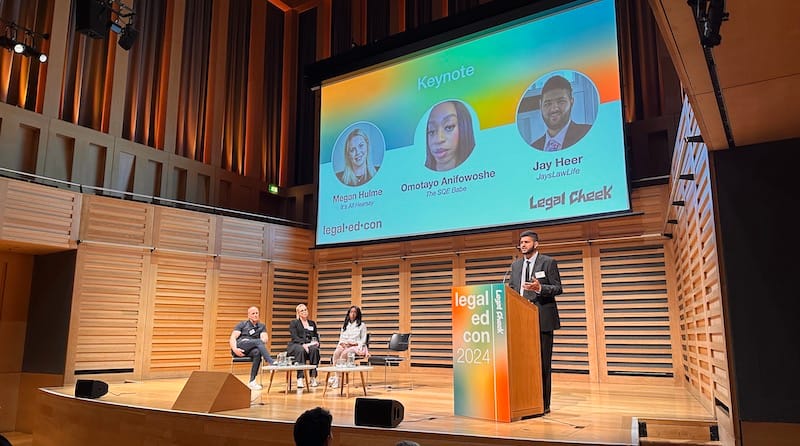
The speakers:
The final session of the day started with Omotayo Anifowoshe, founder of ‘The SQE Babe’ on TikTok. Anifowoshe shared her story and the challenges she is facing while self-funding her legal education. Her TikTok account shares useful tips with students following the same path, as well as providing an insight into the unique challenges that self-funding the SQE brings. Anifowoshe argued that while the SQE has its flaws, it does acknowledge that not all individuals have an easy route into the profession.
The second speaker of this session was Jay Heer, a future trainee solicitor at Simmons & Simmons and founder of JaysLawLife. Heer began by sharing his career journey to date. After passing SQE1 in January, Heer completed SQE2 last week and shared his thoughts on the intensity and experience of the exams. While Heer did not find the concept of a new exam daunting, he found that getting answers to SQE-related queries was difficult. He argued that this ultimately creates a fear of the unknown and increased anxiety in students.
The final speaker of LegalEdCon 2024 was Megan Hulme, founder of ‘It’s All Hearsay’ and litigation solicitor. Hulme qualified two years ago and spent her session time discussing the transition from trainee to associate. Hulme argued the importance of forward-thinking, resilience and determination. Hulme also went on to highlight that her progress has increased significantly since qualification, due to the ability to stay with one team and understand the way senior members of the team like work to be completed.
Alex Aldridge, Legal Cheek‘s publisher, brought the conference to a close, thanking the speakers, delegates and headline sponsors BARBRI, BPP University Law School and The University of Law, as well as silver sponsors LexisNexis and The City Law School, and additional sponsors Oxford University Press, The National Association of Licensed Paralegals, Intellek and The Food Chain.

